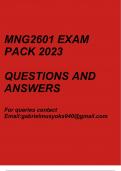MNG2601 EXAM
PACK 2023
QUESTIONS AND
ANSWERS
For queries contact
Email:
,Table of Contents
Welcome ...............................................................................................................................................
2
Potential Exam Questions 1 ............................................................................................................... 4
Potential Exam Questions 2 .............................................................................................................
14
Potential Exam Questions 3 .............................................................................................................
29
Potential Exam Questions 4 .............................................................................................................
43
© 2018 Together We Pass. All rights reserved.
3
,MNG2601 General Management
1. Managers at all levels of the organisation need three management skills, but they need it in
different proportions from level to level.
Middle-level managers must have the ability to …………………….. top-level managers must have the
ability to ………….. and lower-level managers must have the ability to …………….
a) perform jobs such as data entry in a computer
b) see things as a whole and the interrelationship of their parts
c) get employees to achieve organisational goals
1. b, a, c
2. b, c, a
3. a, b, c
4. c, b, a
2. The management process comprises four management functions, which managers perform in
a specific sequence.
Select an example of each management function and list it in the correct sequence.
a) conduct a job interview to fill a vacant position
b) determine how many units must be produced during a shift
c) praise an employee for reaching his sales target
d) adjust the budget to reflect an increase in wages
1. a, b, c, d
2. b, a, c, d
3. c, b, d a
4. d, c, b, a
3. Match each situation in column A with an appropriate management role in column B.
COLUMN A COLUMN B
Situation Management role
a discuss the organisation's offer on a wage increase with union representatives e decisional
b read the Business Day first thing in the morning f interpersonal
c develop new total quality management techniques g informational
d have a mentoring session with an employee
1. ae bf cg de
2. ef bg ce df
3. ag be cf dg
4. ef bg ce dg
Question 4 - 7
The following statements pertain to the evolution of management theory. Answer the questions
that follow.
a) A famous series of studies, known as the Hawthorne studies, gave momentum to this
© 2018 Together We Pass. All rights reserved.
4
, perspective on management.
b) This researcher was a mechanical engineer and he studied the work of individual workers to
discover exactly how they performed their tasks.
c) According to this approach, certain disabilities can cripple an organisation.
d) This perspective on management comprises management science and operations research.
e) This approach views an organisation as a group of interrelated parts with a single purpose: to
remain in balance.
f) This famous researcher based his model on legal authority, which stems from rules and other
controls that govern an organisation in its pursuit to achieve goals.
g) The basic premise of this approach is that the application of management principles depends
on a particular situation that a manager faces at a given time.
h) Hammer and Champy are experts in this approach that entails a significant reassessment of a
particular organisation.
i) This approach to management grew out of the need to find guidelines for managing complex
organisations such as factories.
4. Statement ……………….. refers to the human relations movement, statement ……………. refers to
the learning organisation and statement………………. refers to the administrative approach to
management.
1. a, b, e
2. b, f, i
3. a, c, i
4. d, g, h
5. The three management theories that comprise the classical approach to management are
described in statements
1. a, c, i
2. b, f, i
3. c, d, g
4. i, h, e
6. Statement ………………. describes the contingency approach to management and statement
……………… describes the qualitative approach to management.
1. a, b
2. g, d
3. c, b
4. e, f
7. Statement ………………. refers to Max Weber's approach to management, while statement
……………. refers to ………… Peter Senge's perspective.
1. a, b
2. b, g
3. f, c
4. f, b
© 2018 Together We Pass. All rights reserved.
5




